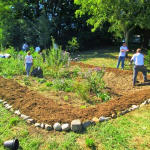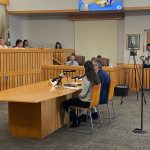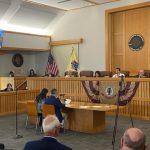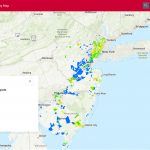New Jersey Future Blog
Planning for Climate Resilient Stormwater Infrastructure
July 17th, 2023 by Patricia Dunkak
“Watersheds are not political and do not follow political delineations,” said Mayor Andrew Nowick from the City of Lambertville at the 2023 NJ Planning and Redevelopment Conference (NJPRC). As flooding increases due to increased intense rain events and aging stormwater infrastructure, it is more important than ever to plan ahead to protect all New Jerseyans in the face of climate change. A recent NJ Department of Environmental Protection (NJDEP) and Northeast Regional Climate Center study found that the 100-year storms are projected to increase as much as 50%, placing areas not previously in flood zones at risk of severe flooding. Additionally, many waterways in NJ are impaired, which is due in part to non-point source pollution generated by stormwater runoff that is worsened by large quantities of impervious cover. Stormwater rules and permits are being updated in New Jersey to manage both current and future storms, and are encouraging holistic watershed planning and regional solutions, since stormwater, as noted above, does not follow municipal boundaries.
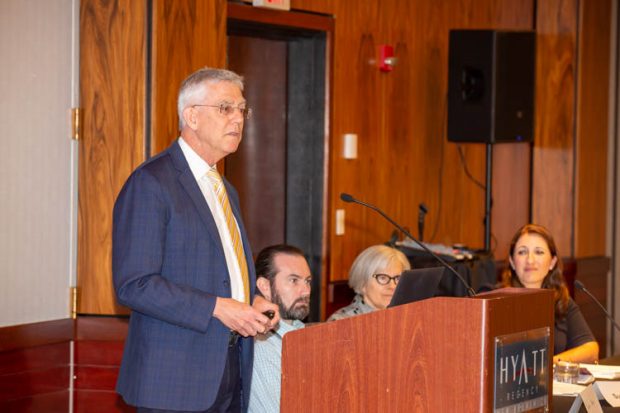
Clinton Andrews speaking during the Upstream/Downstream: Redevelopment or Retreat? Flood Protection Rules, Planning, and Mitigation session at the 2023 NJ Planning Redevelopment Conference. Photo by Frank H. Conlon
Two expert panels explored state stormwater permits and regulations, watershed planning, financial impacts, case studies, and solutions at the 2023 NJPRC sponsored by New Jersey Future and the New Jersey chapter of the American Planning Association. The session Upstream/Downstream: Redevelopment or Retreat? Flood Protection Rules, Planning, and Mitigation featured Clinton Andrews, Associate Dean for Research at Edward J. Bloustein School of Planning & Public Policy, Rutgers University, Gabriel Mahon, Bureau Chief of NJPDES Stormwater Permitting and Water Quality Management, NJDEP, Jennifer Phillips Smith, Director & Co-Chair of Real Estate Group, Gibbons P.C., and Susan Bristol, the Municipal Policy Specialist at The Watershed Institute. The session A Watershed Moment: Planning and Funding Stormwater Improvement Projects featured Mayor Nowick from the City of Lambertville, Bill Cesanek, Vice President of CDM Smith, Gabriel Mahon, Bureau Chief of NJPDES Stormwater Permitting and Water Quality Management, NJDEP, James Thompson, Campaigns Director, NJ League of Conservation Voters, and Lindsey Sigmund, Program Manager at New Jersey Future.
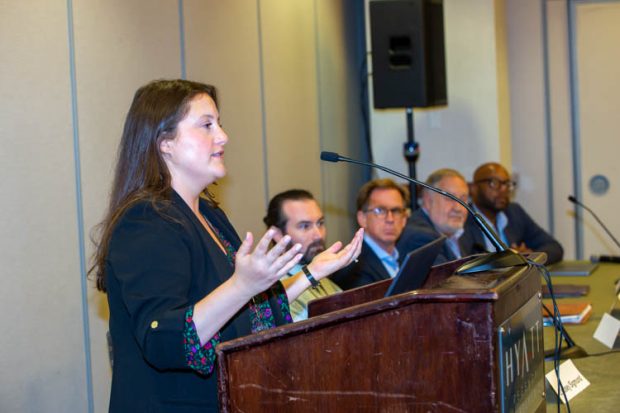
Lindsey Sigmund speaking during the A Watershed Moment: Planning and Funding Stormwater Improvement Projects session at the 2023 NJ Planning Redevelopment Conference. Photo by Frank H. Conlon
NJDEP’s Gabe Mahon provided attendees with an overview of how the state is planning to enhance climate resilient stormwater infrastructure. NJDEP issued the updated Tier A Municipal Separate Storm Sewer System (MS4) Permit, effective on January 1, 2023, which represents a major change from previous MS4 permits with the addition of a Watershed Improvement Plan requirement aimed at improving water quality and reducing flooding. This three-phased requirement includes the mapping of all stormwater infrastructure, including green infrastructure; outlining water quality improvement projects; and a final report that summarizes proposed projects, implementation schedules, and expected costs.
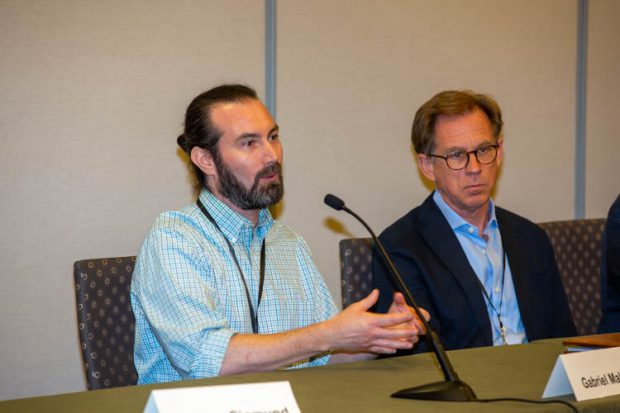
Gabriel Mahon, Bureau Chief of NJPDES Stormwater Permitting and Water Quality Management, NJDEP, speaking during the 2023 NJ Planning Redevelopment Conference. Photo by Frank H. Conlon
Another large rule change at the state is New Jersey Protection Against Climate Threats (NJ PACT), which directed NJDEP to incorporate climate change data into its regulatory and permitting programs. Phase 1 of the rule, the Inland Flood Protection Rules proposed in December 2022 and will be effective in July 2023, requires the use of updated precipitation data to analyze flood potential and design stormwater infrastructure, including green infrastructure. This rule will amend the Stormwater Management Rules, N.J.A.C. 7.8 and the Flood Hazard Area Control Act Rules, N.J.A.C. 7:13. The updated stormwater rules will require systems to be designed to manage both current and future storms. The updated permit and major rule changes will impact how and where development and redevelopment occur, which will lead to more climate resilient stormwater infrastructure.
The resiliency of our infrastructure impacts its ability to mitigate and adapt to climate change. Bloutstien’s Associate Dean Andrews emphasized that flooding not only impacts the environment, but also has municipal fiscal and economic implications. Three climate change adaptation strategies included in his presentation are: resist, accommodate, or retreat. Retreat is often a politically unfavorable strategy, but there are successful examples of retreat demonstrated by NJDEP’s Blue Acres program in the Borough of Manville Borough, Township of Wayne, and Township of Old Bridge. Blue Acres protects community members and the environment by relocating NJ families whose homes experience repeat flooding and acquire their property to be used as open space and flood storage. These municipal decisions play out in a regional watershed context.
Susan Bristol, from the Watershed Institute, emphasized the importance of changing the way we develop, which is very important in a highly developed state like NJ with large areas of impervious cover. Human development has changed the natural water cycle and has increased stormwater runoff that contributes to impaired water quality. “Unbuilding” impervious cover and redevelopment can improve stormwater management, meet requirements of the Stormwater Management Rules, and restore watersheds. While large buyouts and redevelopment occur, Jennifer Phillips Smith reminds us that these projects must be economically feasible for the water quality and restoration benefits to occur when these projects are implemented.

Mayor Nowick from the City of Lambertville speaking during the 2023 NJ Planning Redevelopment Conference. Photo by Frank H. Conlon
Mayor Nowick emphasized that areas not previously in a recorded flood zone are experiencing severe flooding, as seen in the City of Lambertville during Hurricane Ida. Unfortunately, flooding events like these are projected to increase due to aging water infrastructure and large areas of impervious surface. The city is using software supplied by NJDEP to map all of their stormwater infrastructure, but they still face limitations, such as staff capacity, resources, and funding. Stormwater and flooding do not follow municipal boundaries, so regional and watershed level planning are important approaches to improving water quality and reducing flooding.
Bill Cesanek underscored the importance of a holistic, integrative, and long-term watershed based planning process that is cost effective to municipalities and improves environmental health. “Watershed Improvement Planning is a key element of integrated water resource and water quality management.” A paradigm shift is required to incorporate watershed improvement planning into sustainable Master Plans. Planners, engineers, community advocates and members are all needed to work together to assist municipalities to manage stormwater, define the Level of Service needed, and meet state level requirements. It is important that watershed improvement planning is equitable, inclusive, and fairly distributes the environmental, social, and economic benefits.
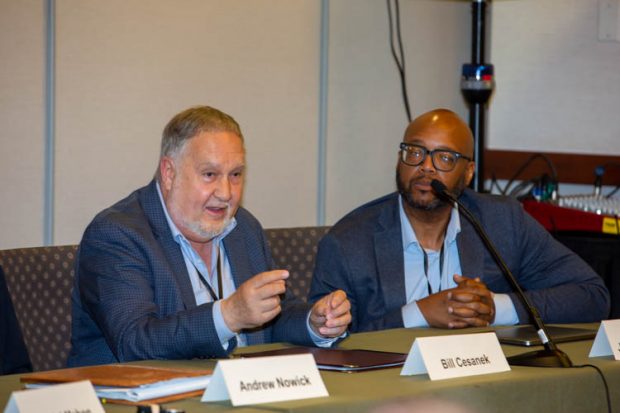
Bill Cesanek, Vice President of CDM Smith, speaking during the 2023 NJ Planning Redevelopment Conference. Photo by Frank H. Conlon
Stormwater infrastructure improvements will be expensive, but there are funding mechanisms and technical assistance available to help municipalities. NJDEP announced the availability of $19 million in stormwater assistance grants to help municipalities comply with new Tier A MS4 permit requirements, such as the mapping of all stormwater infrastructure, as Lambertville is currently undertaking. Additional funding will be necessary, and one viable option for local entities is to establish a stormwater utility. A stormwater utility is a dedicated and equitable funding mechanism to pay for a community’s stormwater management program. As James Thompson explained, there are over 2000 stormwater utilities formed in the United States, but none in NJ so far. In 2019, NJ enacted the Clean Stormwater & Flood Reduction Law that allows municipalities, counties, groups of municipalities, and sewerage and improvement authority to establish a stormwater utility. Last year, NJDEP announced the availability of Technical Assistance for Stormwater Utility Feasibility Studies, which will assist municipalities in completing a stormwater utility feasibility study.
Impaired waterways, large areas of impervious cover and development, and extreme rain events that cause severe flooding demand NJ to holistically approach watershed planning. Expert panelists at the Planning and Redevelopment Conference highlighted state level permits and rules aimed at improving water quality, climate change adaptation strategies, watershed and regional improvement planning, and funding opportunities to upgrade outdated stormwater infrastructure. New state regulations will change where and how we develop, and the solutions described will create more climate resilient infrastructure. The case studies explored and lessons learned are one step toward improving NJ’s water quality, reducing flooding, and improving quality of life in NJ.
Related Posts
Tags: 2023 NJ Planning and Redevelopment Conference, climate change, climate risk, flood, flood protection, flooding, NJPRC23, Stormwater, stormwater management, stormwater management rules, stormwater utilities, Watershed


